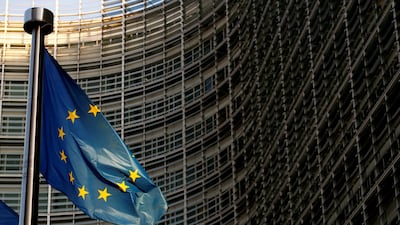The European Union has welcomed the peace accord between the UAE and Israel to normalise relations, calling the move “a fundamental step for the stabilisation of the region as a whole”.
In remarks released by the EU following a flurry of earlier statements from European leaders and officials in Brussels, the 27-member bloc’s high representative said Israel’s agreement to suspend annexation of Palestinian territory was positive.
“The EU welcomes the announcement on the normalisation of relations between Israel and the United Arab Emirates, and acknowledges the constructive role played by the US in this respect,” Josep Borrell said.
“We remain committed to a comprehensive and lasting peace for the entire region and stand ready to work to this end together with our regional and international partners,” he added.
Israel and the UAE announced on Thursday they would begin to establish full diplomatic relations in a US-brokered deal that required Israel to halt its contentious plan to annex occupied West Bank land sought by the Palestinians.
“Israel’s commitment to suspend plans to unilaterally annex areas of the occupied Palestinian territory is a positive step,” the statement from the EU’s foreign policy chief asserted.
"The EU remains firm in its commitment to a negotiated and viable two-state solution built upon the internationally agreed parameters and international law – and reaffirms its readiness to work towards the resumption of meaningful negotiations,” it added.
European governments in London, Paris and Berlin as well as other European capitals have also welcomed the deal.
Hugh Lovatt, a policy fellow with the Middle East and North Africa programme at the European Council on Foreign Relations (ECFR) told The National, that European policy makers had been taken by surprise by the agreement.
“As such, its impact on European thinking is still unclear,” he said. “While the deal has been welcome, official statements have also stressed this development should be a catalyst for renewed Israeli-Palestinian peace-making.”
The agreement has not been welcomed by all sides, with Palestinian President Mahmoud Abbas decrying the deal as a "betrayal".
Mr Lovatt said there were concerns that the deal had “decreased any incentive that Israel could have to end it occupation”.
Dr Anwar Gargash, Minister of State for Foreign Affairs, has stressed that “fundamentally, our initiative is not to solve the Arab-Israeli conflict – this is left to the Palestinian and Israelis.
"Rather, it is to contribute to defusing a time bomb that was threatening the two-state solution."
The ECFR expert said the regional shift created by the UAE-Israel deal had far-reaching implications for the region, affecting European policy from Iran to the eastern Mediterranean.
“The biggest impact of UAE-Israel normalisation will be its formalisation and strengthening of a regional partnership against Iran and Turkey,” Mr Lovatt said.








